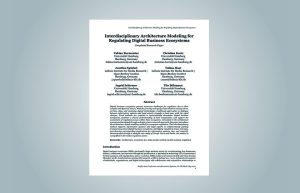In ihrem 2024 auf der Pacific-Asia Conference on Information Systems (PACIS) in Ho-Chi-Minh-Stadt, Vietnam, vorgestellten Beitrag mit dem englischen Originaltitel „Interdisciplinary Architecture Modeling for Regulating Digital Business Ecosystems“ gehen die HBI-Forschenden Josefine Spürkel und Tobias Mast gemeinsam mit den Informatiker*innen Fabian Burmeister, Christian Kurtz und Ingrid Schirmer der Frage nach, wie komplexe soziotechnische Ökosysteme mit Hilfe von Architekturmethoden modelliert werden können.
 Abstract
Abstract
Digital business ecosystems present numerous challenges for regulation due to their complex and dynamic nature. With the growing and opaque interrelations among actors, services, data, and emerging digital technologies, traditional approaches to dialogue between information systems and legal experts struggle to keep pace with the rapid changes. Novel methods are required to systematically decompose digital business ecosystems, facilitate a shared understanding of their complexities, and support the assessment of regulatory issues within these ecosystems. Grounded in the architecture concept and developed through a design science research approach, this paper introduces the architecture-based modeling method for ecosystem regulation. This interdisciplinary method supports information systems and legal experts in collaboratively gaining transparency about digital business ecosystems, identifying regulatory issues and gaps, and deriving corresponding implications for information systems, law, and research. Demonstrated through a multiple case study of Google News and Parler, the method is exemplified in the media regulation sector.

